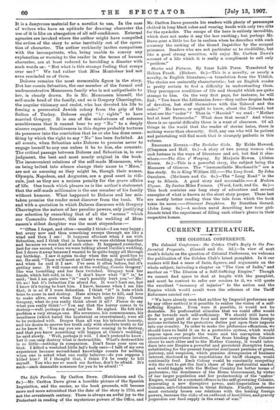CURRENT LITERATURE.
THE COLONIAL CONFERENCE.
The Colonial Conference: the Cobden Club's Reply to the Pre- ferential Proposals. (Cassell and Co. 3d.)—In view of nest week's debate on the question of Colonial Preference, we welcome the publication of the Cobden Club's latest pamphlet. In it our readers will find a mass of facts, figures, and arguments on the whole subject, including a chapter on "The Case of India," and another on "The Illusion of a Self-Sufficing Empire." Though we cannot find space to deal at length with the pamphlet, and must bo content to refer our readers to it, we will quote the excellent "summary of injuries" to the nation and the Empire which would result were the schemes of the Tariff Reformers carried out :— " We have already seen that neither by Imperial preference nor by any other method is it possible to realise the vision of a self- sufficing Empire. Even were it possible, it would not be desirable. No preferential stimulus that we could offer would go far towards such self-sufficiency. We should still have to draw a great part of our food and raw materials from foreign nations irritated by the protective duties put upon their imports into our country. In order to make the pieference efficacious, we should have to build it on to a protective system, which would impose upon our people the waste and the corruption which protection everywhere involves. Far from binding the Colonies closer to each other and to the Mother Country, it would intro- duce into our Empire a powerful and persistent disruptive force, substituting for the present Imperial sentiment passions of greed, jealousy, and suspicion, which genuine divergencies of business interest, disclosed in the negotiations for tariff changes, would continually feed. Each Colony would bo constantly competing with the rest to get the lion's share of the preferential market, and would haggle with the Mother Country for better terms of preference; the dominance of the Home Government, by virtue of her larger population and her protectorship of the 'unfree' Empire, would be a constant offence to the self-ocroveriiing Colonies, generating a new disruptive power, anti-Imperialism in the Colonies, anti-Colonialism in Great Britain. Finally, preference must certainly loosen our relations with the leading foreign powers, increase the risks of an outbreak of hostilities, and gravely jeopardise our food supply in the event of war."






































 Previous page
Previous page